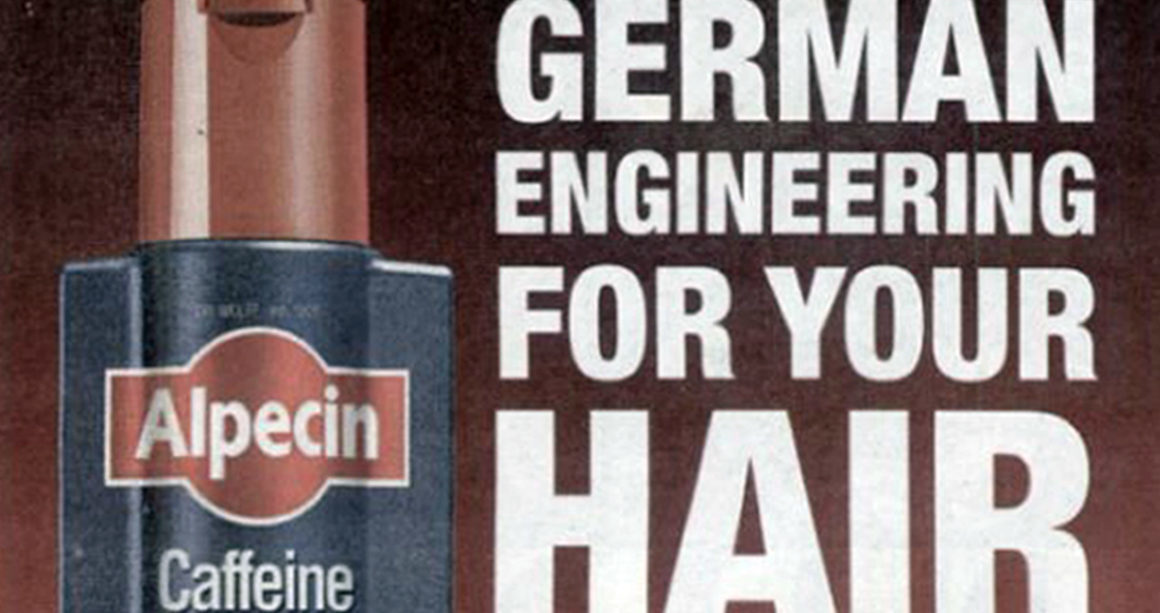
THE makers of Alpecin Caffeine Shampoo must no longer advertise that the product can reduce hair loss after a watchdog ruled there was no adequate evidence to support the claim.
Ads for the product stated: “German engineering for your hair. Shampoo is too small a word for it. Alpecin provides caffeine to your hair, so it can actually help to reduce hair loss. Simply apply daily and leave on for 2 minutes … to help the Caffeine Complex penetrate your hair and scalp.”
A consultant trichologist complained that the claim that the shampoo could “help to reduce hair loss” was unsubstantiated.
Alpecin said its claims did not imply any medicinal action, but said topically-applied caffeine had a long history of use with individuals suffering from thinning hair or increased hair loss, claiming that caffeine was able to counteract the suppression of hair growth induced by testosterone and even stimulate hair growth to the normal level.
It provided eight full studies, several study summaries and a consumer opinion survey which it believed supported the claim that the shampoo could help to reduce hair loss.
The Advertising Standards Authority (ASA) said consumers would understand the claim to mean that using the product would result in a reduced rate and quantity of hair loss.
However it found that none of the information provided by Alpecin included adequate evidence that this was the case, noting that some results were measured using a “hair pull” test.
The ASA said: “Taking into account the body of evidence as a whole, we considered that we had not seen any studies of the actual product as used by consumers on their scalp using an accurate and objective analysis of hair growth, in a well-designed and well-conducted trial.
“We concluded that the claim ‘it can actually help to reduce hair loss’ had not been substantiated and was therefore misleading.”
It ruled that the ad must not appear again, adding: “We told Alpecin not to state or imply that their product could reduce hair loss unless they held adequate evidence to support their claims.”
In a separate ruling, the ASA banned an ad for Sensodyne True White toothpaste after finding there was no evidence to prove that it had a perceptibly greater whitening effect than non-whitening alternatives.
GlaxoSmithKline (GSK) submitted five clinical studies which it said showed that the product was a specialist whitening toothpaste for sensitive teeth.
But the ASA said it had not seen evidence that the toothpaste had a perceptibly greater whitening effect than Sensodyne non-whitening toothpastes, and the ad was therefore misleading.
The ASA said: “We told GSK not to mislead consumers by implying that Sensodyne True White was perceptibly more effective at whitening teeth than other Sensodyne non-whitening toothpastes, unless they held adequate evidence that it was.”
A spokeswoman for Alpecin said: “In numerous studies we have proven the efficacy of our caffeine products. When used daily and left on for two minutes, our caffeine-containing products can help to reduce hair loss.
“Every month we receive a number of emails from satisfied consumers, not only in the UK but in our markets around the
world, who have had great results using our products.”

Enjoy the convenience of having The Sunday Post delivered as a digital ePaper straight to your smartphone, tablet or computer.
Subscribe for only £5.49 a month and enjoy all the benefits of the printed paper as a digital replica.
Subscribe